The Crucial Role of English Proficiency in Software Development
 Sudi David
Sudi David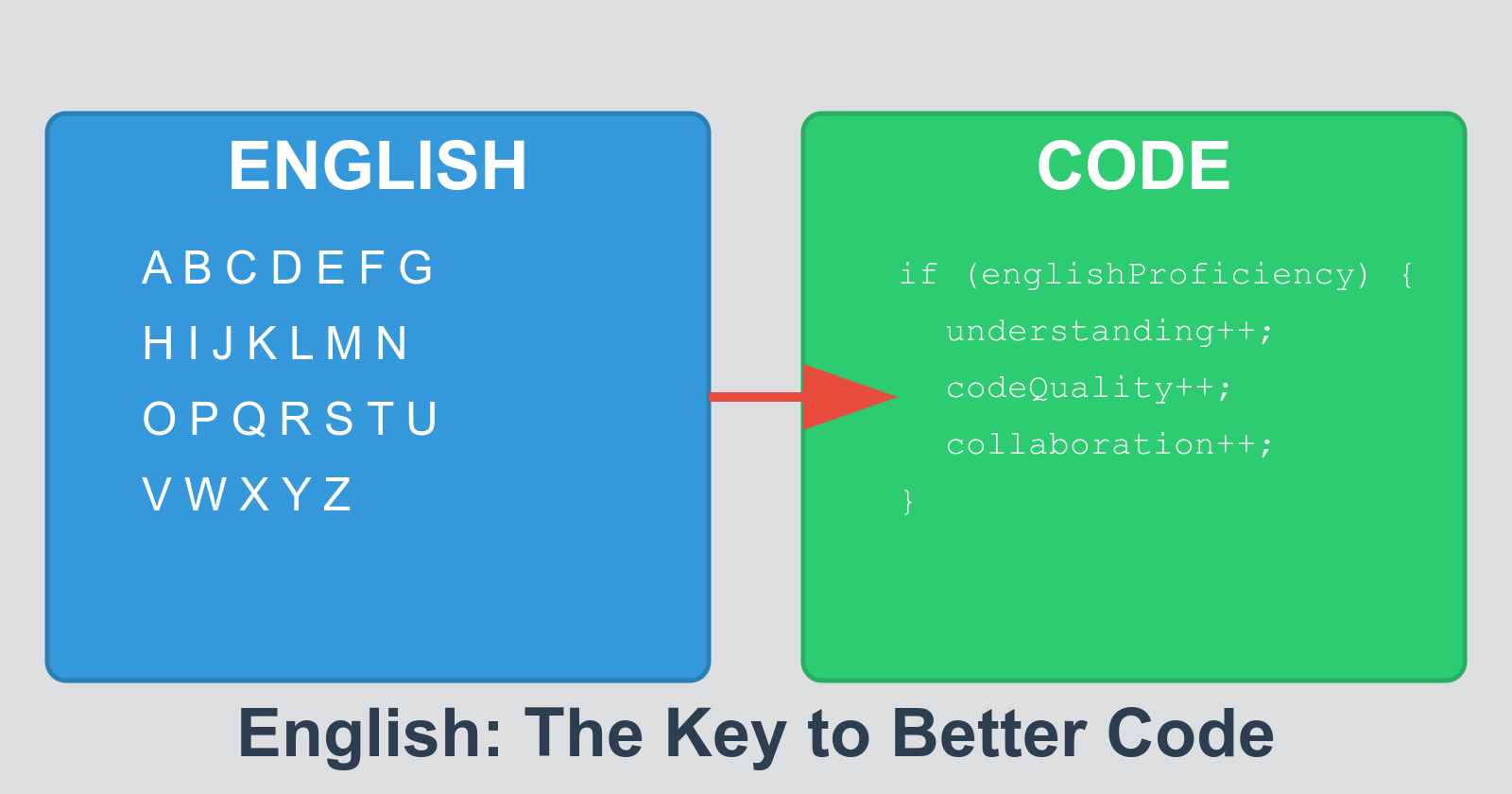
A Personal Journey
As I sat across from my colleague, trying to explain the intricacies of Object-Oriented Programming (OOP), I had an epiphany. The confusion on their face wasn't just about the complexity of the concept – it was rooted in something more fundamental: language. You see, I've been on this incredible journey as a software developer, constantly pushing myself to new heights and striving to master my craft. But along the way, I've discovered a tool that's as crucial as any programming language or framework I've learned: the English language itself.
It was in that moment of explanation, breaking down terms like "polymorphism" and "encapsulation," that I realized how much my understanding of English had shaped my grasp of these concepts. And it got me thinking – how many other developers out there are struggling not just with code, but with the very language that describes it?
This realization set me on a path to explore and share the profound impact that English proficiency can have on a software developer's journey. So, let me take you through my thoughts on why mastering English might just be the secret weapon in your developer toolkit.
The Omnipresence of English in Programming
From the syntax of most programming languages to documentation and online resources, English permeates every aspect of software development. Consider these points:
Programming Languages: The vast majority of programming languages use English keywords and concepts. Understanding these terms in their native language can provide deeper insight into their functionality.
Documentation: Whether it's official documentation, Stack Overflow posts, or GitHub repositories, the lingua franca or the bridge language of the programming world is overwhelmingly English.
Collaboration: In our globalized industry, English serves as the common language for international teams and open-source projects.
Technical Concepts: Many programming paradigms and design patterns have names rooted in English, which often encapsulate their core ideas.
English as a Gateway to Understanding
A solid grasp of English can demystify many programming concepts, making them more intuitive and easier to internalize. Let's explore this idea with a few examples from Object-Oriented Programming (OOP):
1. Polymorphism
Derived from Greek, this word means "many forms." Understanding this definition immediately illuminates the concept in programming—a single interface to entities of different types.
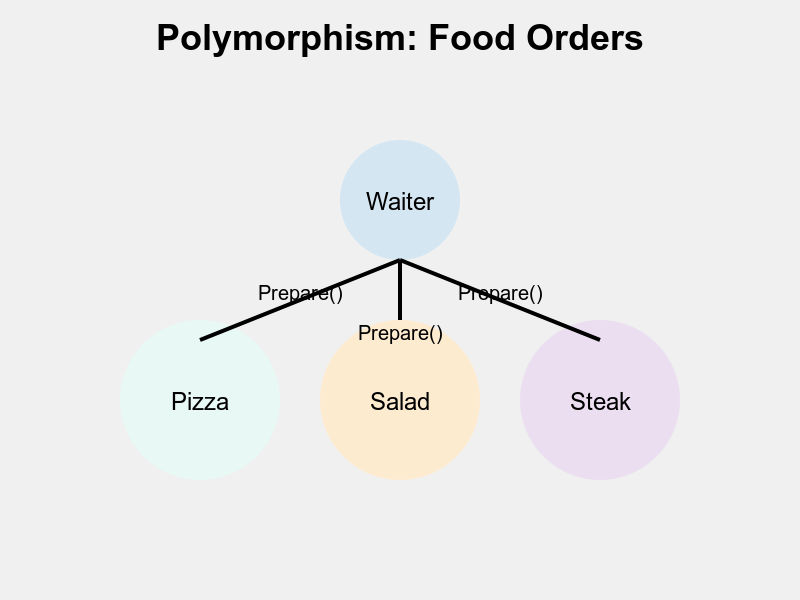
Imagine a waiter in a restaurant. The waiter can take orders for different types of food - pizza, salad, or steak. Each food item is prepared differently, but the waiter uses the same "Prepare" command for all. This is polymorphism in action - one command ("Prepare") behaves differently based on what it's applied to.
In programming, this might look like different types of employees (full-time, part-time, contractor) all having a "calculate pay" method, but each implementing it differently based on their specific payment structure.
2. Encapsulation
In English, this means to enclose something in a capsule. In OOP, it refers to bundling data and methods that operate on that data within a single unit.
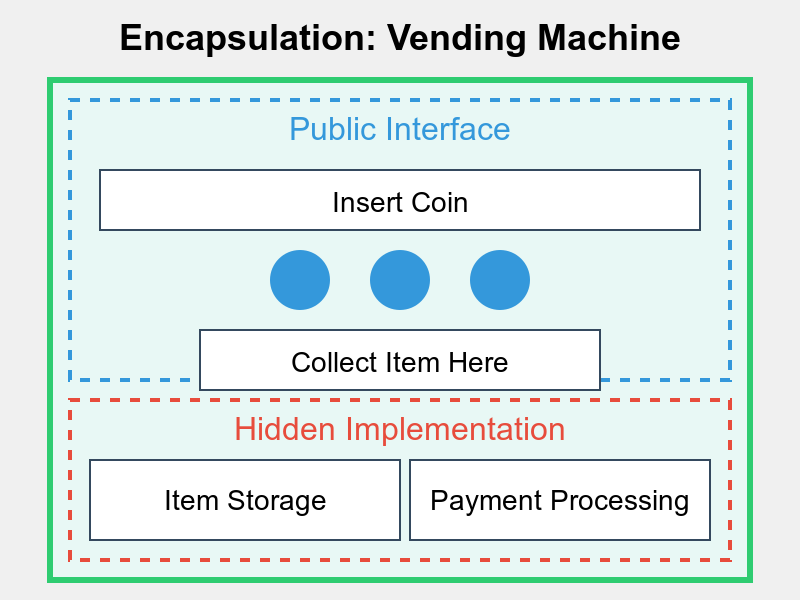
Think of a vending machine. You interact with it through a simple interface - insert coins, press buttons, collect items. But you don't see or interact with its internal mechanisms. The machine encapsulates (hides) its complex inner workings, exposing only what's necessary for operation.
In software, this is like creating a "Customer" class that keeps its data (name, address, etc.) private, only allowing access through specific methods. This protects the data and simplifies the use of the class.
3. Inheritance
The everyday meaning of passing down traits from parents to children directly parallels its use in OOP, where child classes inherit properties and methods from parent classes.
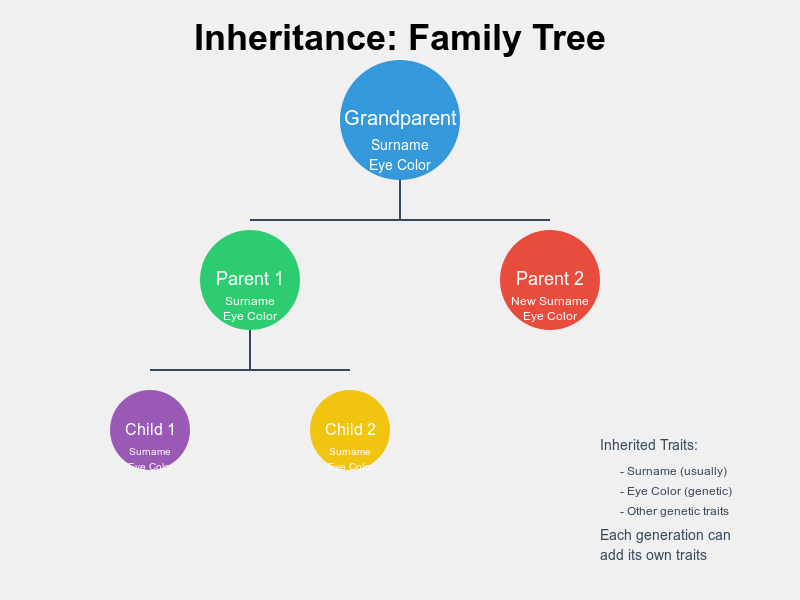
Consider a family tree. Children inherit traits from their parents, who in turn inherited traits from their parents (the grandparents). In programming, this is like a "Vehicle" class passing down basic properties to more specific classes like "Car" or "Motorcycle".
This concept allows for code reuse and the creation of hierarchies of related objects, much like how biological traits are passed down through generations.
4. Abstraction
This concept involves simplifying complex systems by modeling classes based on the essential properties and behaviors they share. Understanding the English meaning of "abstraction" – the quality of dealing with ideas rather than events – helps grasp its programming application of hiding complex implementation details while exposing only the necessary parts.
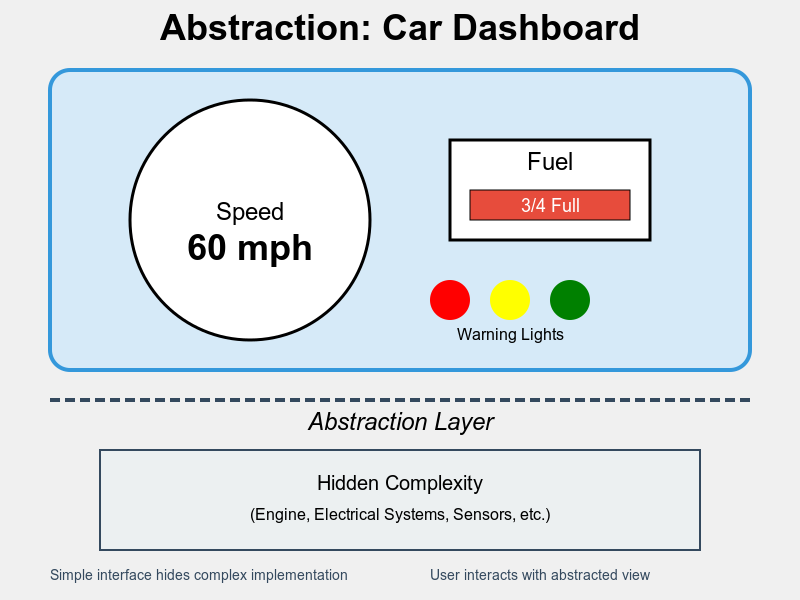
Think about a car's dashboard. It provides a simplified interface to the complex systems of the car. You see the speed, fuel level, and warning lights, but you don't need to understand the intricate mechanics behind them to drive the car. This is abstraction - presenting only the essential information and hiding the complex details.
In programming, abstraction might involve creating a "Shape" class with a "calculate area" method, which different shapes (circle, square, triangle) implement in their own way. The user of these shapes doesn't need to know the specific calculations, just that they can call "calculate area" on any shape.
The Subtle Advantages of English Proficiency
Intuitive Naming: Developers with strong English skills often create more readable and self-explanatory variable names, function names, and comments.
Efficient Learning: As most resources are in English, proficiency allows for faster absorption of new technologies and concepts.
Effective Communication: In an industry that values collaboration, the ability to clearly articulate ideas, problems, and solutions is invaluable.
Cultural Context: Many programming jokes, memes, and cultural references are in English. Understanding these can foster a sense of belonging in the developer community.
Strategies for Improvement
If you're looking to enhance your English skills as a developer:
Read widely: Technical blogs, documentation, and even non-technical English content can broaden your vocabulary and understanding.
Engage in English-speaking developer communities: Participate in forums, attend international conferences, or contribute to open-source projects.
Practice technical writing: Start a blog or contribute to documentation projects to hone your ability to explain complex concepts in English.
Pair programming: If possible, pair with native English speakers to improve both your coding and language skills simultaneously.
Conclusion
While coding skills are undoubtedly crucial, the importance of English proficiency in software development cannot be overstated. It's not just about communication—it's about deepening your understanding of the craft itself. As developers, investing time in improving our English skills can lead to more intuitive programming, better collaboration, and ultimately, mastery of our craft.
Remember, every line of code tells a story, and fluency in English helps us write, read, and understand these stories more effectively. So, as you continue your journey in software development, don't underestimate the power of enhancing your English skills—it might just be the key to unlocking your full potential as a developer.
And to my fellow developers out there, especially those who might be struggling with the language barrier: keep pushing, keep learning, and remember that every word you learn brings you one step closer to not just being a good developer, but a great one. After all, in this beautiful, complex world of programming, we're all on this journey together.
Subscribe to my newsletter
Read articles from Sudi David directly inside your inbox. Subscribe to the newsletter, and don't miss out.
Written by

Sudi David
Sudi David
Hello There, I am Sudi David, a Software Developer who enjoys solving problems. I am on a quest to discover the world of frontend development specially with React.